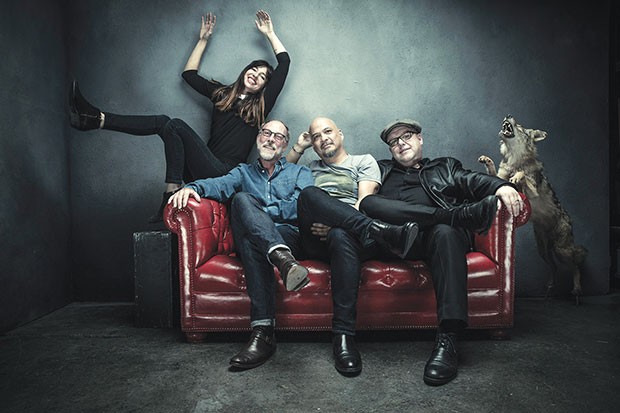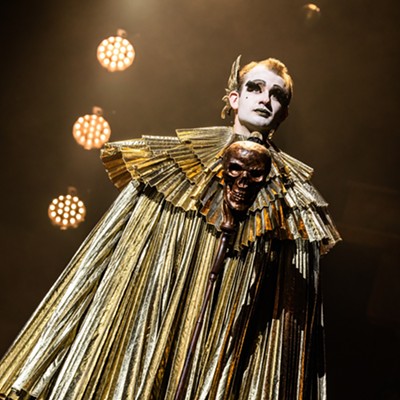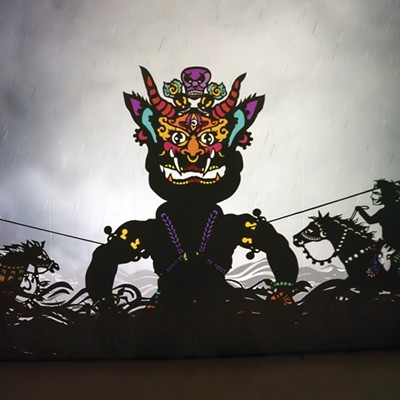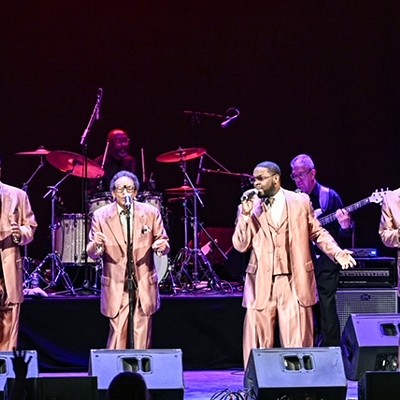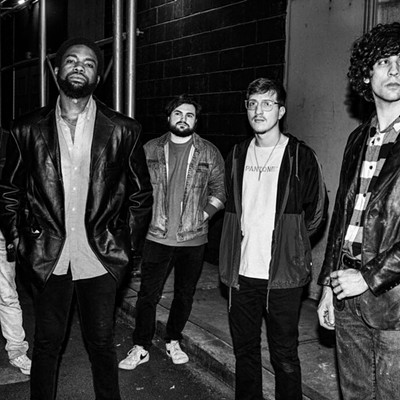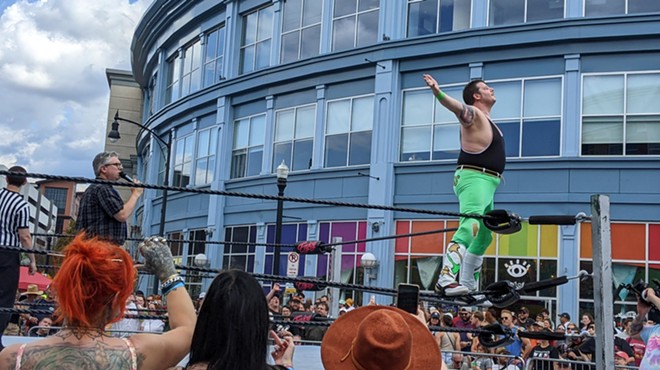“Vamos” is not Pixies’ most popular song, nor the band’s catchiest, but it’s one of the most quintessential, the most Pixies-ish, for lack of a better wording. Everything that makes the band what it is, you’ll find in “Vamos.”
The song opens with some of Black Francis’s trademark Spanglish talking about moving to New Jersey to live with his sister. (Francis studied in Puerto Rico in college; his garbled Spanish runs throughout the band’s discography.) The lyrics are playful, strange and sexual, maybe a little icky (“we’ll stay well bred / we’ll stay well fed, we’ll have our sons / they will all be well hung”). Sound-wise, it’s built on a stubborn backbeat and psychobilly acoustic guitar, and features a cheery chorus, “Vamos a jugar por la playa” — let’s go play at the beach.
“Vamos” has appeared on three separate Pixies releases; first on 1987’s Come On Pilgrim, listed as “Vamos (pilgrim),” then in a slightly longer iteration on Surfer Rosa, and finally as a live version as a B-side to “Gigantic.” The song is important to the group.
If you’ve ever seen Pixies perform “Vamos” live, then you know it for another crucial aspect of the band’s sound: the bombastic, charismatic and playful showmanship of Joey Santiago’s guitar playing. After a couple laps through the chorus, the band backs the groove down to a simmer, on which Santiago improvises. It’s not really a guitar solo. It’s a collection of short bursts, spasms, little seizures of sound and feedback, and humorously showy fingering. The rest of the band usually falls back, giving Santiago the stage. The performance feels like pro wrestling: absurd, funny and very entertaining.
“[The solo] has changed [over the years],” Santiago told CP by phone in a recent interview. “I still get enjoyment out of it, I just don’t like to force it. If it feels forced, I just stop. When it happens, they get the real shit, not the fake bullshit, not an act. It shouldn’t be an act, because it’s a thing. I get into a character, a different character.”
The “Vamos” solo is a rare opportunity for Santiago to get center-stage, since so much coverage of the band has focused on Francis and former bassist Kim Deal, who left Pixies in 2013. There’s no shortage of ink spilled detailing that tumultuous relationship, so we can probably skip that storyline here. What is worth noting is how unlikely it is to find Pixies where they are in 2017.
After the band’s breakup in 1993, Santiago was a bit lost. Deal continued playing with her other band, The Breeders. Francis continued his prolific solo career, as Frank Black and the Catholics. Drummer David Lovering kept drumming and became a magician (sometimes opening for Black). But Santiago had little direction. He continued to perform and record on Black’s solo work, and eventually found film scoring as a second career.
“[Film scoring] was the only thing that I had to offer. That was it. That was the only thing I could do, that I wanted to do,” says Santiago. “I ran into it by accident. One day I just made a pile of music when I found out you could record on a computer, where a regular joe could get it rather than going into an expensive studio. So I just hunkered down and made a bunch of stuff … then I got an agent and handed that stuff over to her and … then Judd Apatow called me to do a TV show.”
The Apatow project was Undeclared, which lasted only a season, but Santiago was able to sustain his career with scoring gigs here and there, including an original song featured in the 1995 movie Empire Records. Santiago’s composing style won’t surprise any fans of his Pixies guitar work. His influences — Clint Mansell, Bernard Herrmann, Philip Glass, Ennio Morricone, John Carpenter — all share his knack for angular, challenging phrases and experimental dynamics. It’s a far cry from John Williams.
In 2004, Pixies reunited and set out on a mammoth world tour. It’s maybe worth noting that this predates the wave of indie-band reunions that dominated the 2010s, fitting in with the band’s habit of doing things first. In the 13 years since the reunion, the group has toured consistently and released two albums, a compilation of previous EPs called Indie Cindy, in 2013, and an album of new original music, in 2016, called Head Carrier. Following Deal’s departure, the current bassist is Paz Lenchantin, formerly of A Perfect Circle.
The reception to both post-reunion releases has been lukewarm, and tabloid interest in Deal’s relationship to the band still dominates much of the band’s press. But it doesn’t seem to matter much, to the fans or the people in the band. Head Carrier isn’t profound, but it sounds like Pixies. It’s hard to be groundbreaking twice.
When CP spoke with Santiago, he was resting up between the two massive legs of this year’s tour, which comes to Stage AE on Oct. 4. He was in “daddy mode,” riding his bike, hanging with his dogs. He might have been making a sandwich during the interview. He sounded relaxed, happy and at ease, which is exactly how Pixies sound in the band’s current iteration. “Comfort” isn’t necessarily the best condition under which to make great art, but for a massively influential band 30 years into a career saddled by turmoil and tabloid controversy, maybe it’s what it needs.

